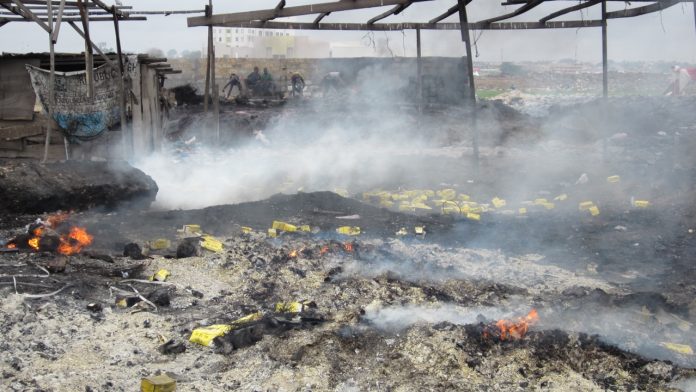Chicken eggs from the Agbogbloshie slum in Ghana’s capital Accra contain dangerous levels of toxins due to the influx of electronic waste from Europe, a new report reveals.
The slum, known as the world’s largest e-waste site, on a daily basis welcomes old computers, fridges and other electronic goods from Europe putting the lives of over 80,000 people in that vicinity at risk.
A latest report from Ipen and the Basel Action Network, said chicken eggs from the ‘Electronics Graveyard’ contain harmful substances such as dioxins and polychlorinated biphenyls (PCBs).
Hundreds of illiterate youth on a daily basis rip off electronic waste to recover metals containing dangerous substances at Agbogbloshie slum to make ends meet while jeopardising their health.
The improper disposal of the waste is allowing the most hazardous chemicals on Earth to enter the food chain in the West African country from illegally disposed electronic waste coming from Europe.
The two environmental groups, according to the new report, analysed eggs laid by the free-range chickens that forage in Agbogbloshie, home to an estimated 80,000 people who subsist primarily by retrieving and selling copper cable and other metals from e-waste.
The analysis revealed that an adult eating just a single egg in the Agbogbloshie scrap yard and slum would exceed the European Food Safety Authority limits on chlorinated dioxins 220 times over. Other toxic chemicals were present in similarly worrying concentrations, including PCBs and fire-retardant compounds. Dioxins, in particular, are highly damaging even in small concentrations.
The report has underlined again the problems in regulating the transfer of toxic waste materials from Europe to African countries, including Ghana, Tanzania and Nigeria, leading to calls for tougher hazardous waste regulation enforcement under the current Stockholm Convention.
The analysis of the eggs was carried out by Basel Action Network, which fitted waste from Europe with monitors and tracked it to Ghana and other countries.
Activists have been calling for stricter enforcement of rules governing the transfer of waste containing toxic chemicals, to prevent it ending up in countries without the infrastructure to dispose of it safely.
“Europe needs to contend with its toxic e-waste, rather than routing it to developing countries, such as Ghana, where hazardous chemicals contaminate populations (especially the vulnerable) and the environment, as a result of mishandling and existing indiscriminate disposal practices,” said Sam Adu-Kumi of the Ghana Environmental Protection Agency to The Guardian.
“African countries should not be used as an e-waste dumping ground any more, as we do not have the technological capacity to deal with waste containing high levels of persistent organic pollutants.”
Jindrich Petrlik, lead author of the report and a member of Ipen’s dioxin, PCBs and waste working group, said: “Dioxins are extremely toxic in very small amounts; there is a concern when these substances are identified in even tenths of picograms. However, our sampling revealed levels measured in very high quantities, indicating [that] vast amounts of these unregulated, highly toxic chemicals are reaching Africa in e-waste and entering the food chain.”
Source: Daily Mail GH





